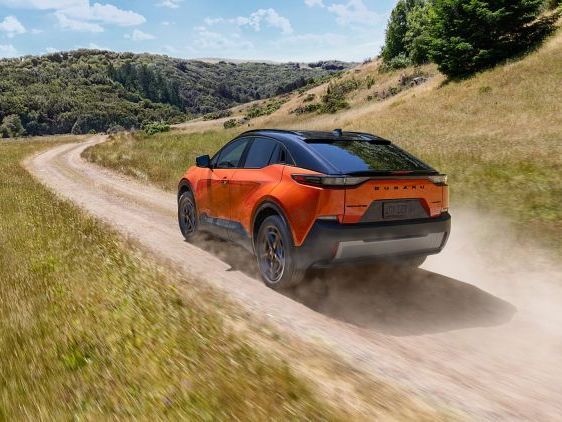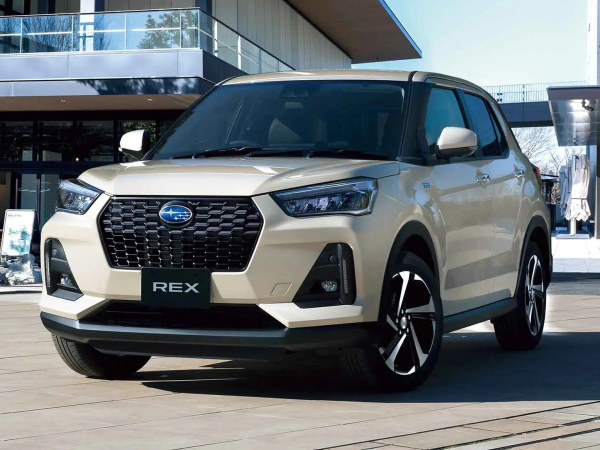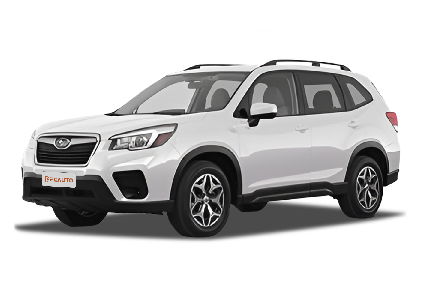Q
Does the 2019 Forester have good resale value?
The 2019 Subaru Forester holds its value pretty well in Malaysia's used car market, and that's largely down to the brand's solid reputation, the uniqueness of its Symmetrical All-Wheel Drive system, and how the model stacks up in terms of safety and practicality. The Forester comes standard with the EyeSight driver assistance system (on some trims), a high-tensile steel body, and that signature boxer engine tech – features that used car buyers see as having long-term worth, especially handy for Malaysia's rainy conditions and family-focused drivers. Typically, a 5-year-old Forester retains about 5-10% more of its value than other Japanese SUVs in its class. Of course, the actual price depends on the condition, mileage, and service history – so keeping those original service records intact is a smart move to boost resale value.
It's worth noting that Malaysian consumers generally have a thing for SUVs with good fuel economy and high ground clearance. The Forester's 2.0L Boxer engine delivers smooth power, but maintenance costs can be a bit steeper than your average inline engine. If you're eyeing a used one, I'd strongly recommend getting a professional inspection done through an authorized Subaru dealer first.
In the same segment, the Honda CR-V and Toyota RAV4 are also tough competitors when it comes to retaining value, but the Forester still carves out its own niche thanks to its imported status and go-anywhere character.
Special Disclaimer: This content is published by users and does not represent the views or position of PCauto.
Related Q&A
Q
What is the difference between 2018 and 2019 Forester?
The main difference between the 2018 and 2019 Subaru Foresters lies in the fact that the 2019 model received a full fifth-generation redesign. The exterior got a more modern look, with slightly increased overall dimensions and a 30mm longer wheelbase that improves rear passenger space. The 2019 Forester switched to the new Subaru Global Platform (SGP), which significantly boosted body rigidity and optimized the suspension system, leading to noticeable improvements in driving stability and cabin noise insulation.
Under the hood, the 2019 model in the Malaysian market primarily features a 2.0-liter direct-injection naturally aspirated engine paired with a Lineartronic CVT transmission. While horsepower remains similar to the 2018 version, fuel efficiency sees an uptick. Inside, the 2019 Forester gets an all-new interior design, with a larger standard infotainment screen and, for the first time, the inclusion of Subaru's EyeSight driver assistance system (on select trim levels), which bundles adaptive cruise control and pre-collision braking.
Notably, the 2019 model dropped the previous turbocharged variant but enhanced the functionality of the X-Mode off-road system. For Malaysian consumers, the 2019 Forester better meets the latest ASEAN NCAP safety standards. It also retains a 220mm ground clearance, making it well-suited to local road conditions. If considering a used car purchase, the 2019 model's updated platform offers potential long-term durability benefits. Meanwhile, some 2018 models might present more attractive pricing due to the lack of the EyeSight system.
Q
How big is the gas tank on a 2019 Forester?
The 2019 Subaru Forester has a fuel tank capacity of 16.6 gallons (approximately 63 liters), a design that delivers an extended driving range, perfect for both long highway trips and daily city commutes in Malaysia. As a compact SUV, the Forester's tank size strikes a nice balance between fuel efficiency and practicality. Paired with its 2.5-liter boxer engine and Symmetrical AWD system, it handles a variety of road conditions – from Malaysia's frequent rainy season wet roads to rough suburban terrains. For owners who love road trips or often drive between states, that larger tank means fewer stops at the pump and more convenience. Keep in mind, though, actual range can vary based on driving habits, road conditions, and vehicle load. Regular maintenance is a good idea to keep fuel efficiency in check. Also, the Forester's fuel tank is made of resin, which is lightweight and corrosion-resistant – a common feature in Subaru models.
Q
What kind of engine is in the 2019 Subaru Forester?
The 2019 Subaru Forester in the Malaysian market comes with a 2.0-liter horizontally opposed four-cylinder naturally aspirated engine (FB20 type), delivering 156 horsepower and 196 Nm of peak torque. It's paired with a Lineartronic continuously variable transmission (CVT) and the Symmetrical All-Wheel Drive system. This engine features direct injection technology, optimizing fuel efficiency and low-end torque performance—perfect for Malaysia's mix of urban and suburban roads. The boxer engine's low center of gravity enhances cornering stability, while the full-time AWD system handles slippery wet roads during the monsoon season. Notably, Subaru's engine layout stands out from most brands; its horizontally opposed configuration effectively reduces vibration, though owners should keep up with regular maintenance to ensure long-term reliability. If you're craving more power, check out the brand's turbocharged models, but the naturally aspirated version is easier on maintenance costs and fuel compatibility—better suited for Malaysia's daily driving conditions.
Q
What is the oil temperature in Forester 2019?
The oil temperature of the 2019 Subaru Forester typically stays between 90°C and 110°C under normal driving conditions. It might briefly rise to around 120°C during spirited driving or in high-temperature environments, but the boxer engine and efficient cooling system do a solid job of keeping it in check. For Malaysian owners, the tropical climate could push the oil temperature a bit higher. I'd recommend regularly checking the oil condition and using fully synthetic oil that meets the factory specs to ensure optimal lubrication and heat dissipation. Oil temperature is a key indicator of engine health—too high can cause lubrication failure, while too low hurts fuel economy. The Forester's oil temperature gauge or warning light helps keep an eye on any issues. During routine maintenance, besides oil temperature, keep an eye on coolant levels and radiator cleanliness since these also affect oil temperature indirectly. If you notice the oil temperature spiking abnormally often, head to an authorized service center for a professional check to avoid potential long-term engine damage from prolonged high temperatures.
Q
How many litres are in a 2019 Subaru Forester?
The 2019 Subaru Forester has a 55-liter fuel tank, which is above average for its SUV class. That's a solid size for both long highway drives and city commutes here in Malaysia. True to Subaru's focus on practicality and safety, the tank design also ties into the Forester's fuel efficiency. Pairing the 2.0-liter boxer engine with the Lineartronic CVT delivers a smooth ride and pretty decent gas mileage. For Malaysian drivers, 55 liters means fewer stops at the pump since you can cover more ground on a full tank. Plus, Subaru's Symmetrical All-Wheel Drive system is a real plus during Malaysia's rainy seasons, giving better grip and stability on wet roads. And hey, keeping up with regular maintenance and driving smart can definitely help stretch that fuel even further. It's always a good idea to stick to the official service schedule to keep your Forester running at its best.
Q
How to check oil level 2019 Subaru Forester?
To check the oil level in a 2019 Subaru Forester, first make sure the vehicle is parked on level ground and the engine is turned off. Wait 5-10 minutes to let the oil drain back into the oil pan, then pop the hood and locate the dipstick—it’s usually got a yellow or orange pull tab. Pull it out, wipe it clean with a rag, stick it back in all the way, then pull it out again. Check where the oil mark lands—it should be between the "MIN" and "MAX" lines. If it’s below "MIN", top it off with the oil specified in the owner’s manual. If it’s at or above "MAX", you’ll need to drain some out to prevent engine damage. With Malaysia’s hot climate, it’s a good idea to check the oil condition regularly too. If it looks black or has metal particles, you might need an early oil change. Also, the Forester’s boxer engine tends to burn a bit more oil than inline engines, so owners should get in the habit of checking it monthly to keep the engine well-lubricated and extend its life.
Q
How much oil does a 2019 Subaru Forester take?
The 2019 Subaru Forester has an oil capacity of approximately 5.4 liters, including the oil filter. If you're just changing the oil without replacing the filter, you'll need around 5.0 liters. The exact amount might vary slightly depending on the engine model or region, so it's best to check your vehicle's owner's manual or consult an authorized Subaru Malaysia dealer for precise info. In Malaysia's hot and humid climate, picking the right oil viscosity is super important. The Forester typically recommends 0W-20 or 5W-30 full synthetic oil – these types hold up well under high temperatures, maintaining good lubrication while also helping boost fuel efficiency. Regular oil and filter changes are key to keeping your engine healthy; it's generally advised to do this every 10,000 kilometers or 6 months, whichever comes first. Plus, Subaru's Boxer engine has that unique horizontally opposed design, which means it's a bit pickier about oil. So make sure you use oil that meets Subaru's certification standards to keep the engine running smoothly for the long haul. If you're not sure how to choose the right oil or handle the maintenance, head over to Subaru Malaysia's official service centers. Their professional technicians will hook you up with solid advice and service.
Q
How big is the fuel tank on a 2019 Subaru Forester?
The 2019 Subaru Forester has a 55-liter fuel tank capacity. This design balances daily commuting and long-distance travel needs while delivering solid range performance. For Malaysian users, a 55-liter tank is above average for the SUV class, handling most driving scenarios—like the KL to Penang highway run without constant refueling stops. As a practical, safety-focused SUV, the Forester's tank design also factors in fuel economy. Paired with its 2.0-liter boxer engine and CVT transmission, it delivers well-rounded fuel efficiency. Malaysia's varied road conditions, from city traffic jams to rural mountain roads, are no match for the Forester's tank size and fuel efficiency, ensuring consistent driving experiences. If you frequently take long trips, make sure to regularly check the fuel tank and system for optimal performance and safety. Also, keep an eye on Subaru's recommended fuel additives to keep the engine clean and running efficiently.
Q
Is 2019 Forester direct injection?
The 2019 Subaru Forester does come with Direct Injection technology. It's powered by Subaru's FB20 2.0-liter horizontally opposed four-cylinder engine, which combines direct fuel injection with Subaru's unique DOHC (Double Overhead Camshaft) design. This setup boosts fuel efficiency and power output while cutting emissions, making it perfect for both city driving and long trips around Malaysia. The perks of direct injection lie in finer fuel atomization and more precise control over fuel delivery, which ramps up combustion efficiency. But here's the thing—over time, carbon buildup might form on the intake valves, so regular engine maintenance is a good idea to keep it running at its best. Subaru's Symmetrical All-Wheel Drive system is another big win for the Forester. Paired with X-Mode off-road mode, it handles Malaysia's diverse road conditions with ease, whether it's slippery wet roads during the monsoon or rough terrain in the countryside. On top of that, the Forester is equipped with the EyeSight driver assist system, offering features like pre-collision braking and adaptive cruise control to up the safety ante even more. For Malaysian buyers, the 2019 Forester strikes a solid balance between technology, performance, and practicality, making it a SUV well worth considering.
Q
What is the maintenance schedule for a 2019 Forester?
The 2019 Subaru Forester's maintenance schedule recommends regular servicing every 6 months or 10,000 kilometers, whichever comes first. This primarily involves an oil and oil filter change, along with inspections of the brake system, tires, suspension, and undercarriage. You'll also need to replace the air filter every 30,000 kilometers and the spark plugs every 60,000 kilometers. For the transmission fluid and differential oil, it's advisable to check or replace them every 40,000 kilometers to maintain optimal four-wheel-drive performance.
Given Malaysia's climate, pay extra attention to cleaning the cabin air filter – replace it every 15,000 kilometers. The hot and humid conditions can easily lead to mold growth, which affects in-car air quality. Additionally, if you mostly do short city drives, consider shortening the oil change interval to 5,000 kilometers since frequent stop-starts accelerate oil degradation.
The Forester's EyeSight driver assistance system also requires regular calibration, especially after replacing the windshield or being involved in a collision. It's best to have this done at an authorized service center. Note that maintenance intervals may need adjustment based on actual driving conditions. For example, if you frequently drive on gravel roads or coastal areas, you should inspect the brakes and check for undercarriage rust earlier than scheduled.
Popular Cars
Model Year
Car Compare
Car Photo
Latest Q&A
Q
Does more RPM mean more torque?
The relationship between engine speed (RPM) and torque is not a simple linear proportionality, but rather an inverse relationship under the premise of constant power. At low engine speeds, due to the extended fuel injection and intake duration, the combustion pressure inside the cylinders increases, resulting in higher torque output, which is suitable for scenarios requiring strong traction such as vehicle launch, hill climbing, or heavy loads. Conversely, torque decreases at high speeds, but power may increase to support high-speed driving. This characteristic stems from the physical formula "Power = Torque × Speed × Constant." Therefore, different vehicle models are calibrated for torque curves based on their intended purposes. For example, diesel engines or turbocharged engines typically emphasize high torque at low speeds, while high-performance vehicles prioritize power output at high speeds. In daily driving, rationally utilizing transmission gear ratios to match speed and torque (such as using first gear for high-torque hill climbing and higher gears for low-RPM cruising) can optimize fuel economy and dynamic performance.
Q
What is the maximum torque a human can apply?
The maximum torque that a human can apply with one hand typically ranges from 60 to 120 Newton-meters, with the specific value depending on individual strength, force application posture, and tool usage. When an average adult uses a standard wrench, a grip force of 200 Newtons can generate approximately 100 Newton-meters of torque when calculated with a 0.5-meter lever arm. However, due to muscle efficiency limitations, the actual output is mostly 50%-70% of the theoretical value. Professional athletes or manual laborers can achieve 25-30 Newton-meters through training, while specially trained individuals such as rock climbing enthusiasts can generate finger torque of up to 40 Newton-meters. Tools can significantly amplify torque output; for example, a regular wrench can multiply human force by 3-5 times, but sustained force application requires consideration of muscle fatigue. Daily operations like tightening screws or turning a steering wheel typically maintain torque within the range of 5-50 Newton-meters. Torque calculation follows the physical principle of force multiplied by lever arm, and in practical operations, attention should be paid to the influence of force application angle and joint range of motion on the final torque value.
Q
What is low RPM high torque?
Low RPM high torque refers to the characteristic of an engine that can deliver substantial torque within a relatively low RPM range (typically 1500-3000 rpm). This design significantly enhances a vehicle's launch acceleration and hill-climbing capability. When engine power remains constant, torque is inversely proportional to RPM. Consequently, generating high torque at low RPM enables the crankshaft to produce greater power per revolution, providing ample traction without requiring high engine speeds—particularly advantageous for urban stop-and-go driving or mountainous terrain. Turbocharged models often excel in this regard; for instance, certain popular local SUVs achieve peak torque at 1800 rpm, facilitating loaded hill ascents or overtaking maneuvers. By contrast, low-torque engines must rely on higher RPMs to compensate for power deficiency, resulting in increased fuel consumption and acceleration lag. Notably, the low-RPM high-torque characteristic also reduces shift frequency, minimizes mechanical wear, and improves driving smoothness—especially beneficial for drivers frequently encountering congested conditions. When evaluating this parameter during vehicle selection, prioritize models whose torque curve peaks earlier, typically indicated in specifications as "XX N·m @ 1500-4000 rpm."
Q
How much torque is 1800 RPM?
The torque value at 1800 RPM needs to be calculated in combination with engine power, and the specific numerical value depends on the power output at this rotational speed. According to the physical formula "Power = Torque × Rotational Speed ÷ 9550", when power is constant, torque is inversely proportional to rotational speed. This means that when the engine speed is 1800 RPM, if the vehicle is in a low-speed, high-load working condition (such as climbing a slope or starting with a heavy load), the torque output will be relatively high to provide sufficient traction; while during flat-road cruising, the torque at the same rotational speed may decrease moderately to optimize fuel efficiency. Turbocharged engines usually form a wide torque plateau in the range of 1500-4500 RPM, and 1800 RPM falls precisely within this range, delivering over 90% of the peak torque. For example, a 1.5T engine can generate approximately 250-300 Nm of torque at this rotational speed. In actual driving, by monitoring the tachometer and coordinating throttle control, the torque characteristics at this rotational speed can be effectively utilized to achieve smooth acceleration or overcome gradients. It should be noted that different engine calibrations will result in variations in torque curves, so it is recommended to consult the torque-speed curve diagram of the specific vehicle model to obtain accurate data.
Q
Why is it almost impossible to rev to 21000 RPM?
It is nearly impossible to increase the engine speed to 21,000 revolutions per minute, primarily constrained by the comprehensive limitations of material physical limits, mechanical structural strength, and engineering design. The inertial forces exerted on moving components within the engine, such as pistons and connecting rods, at ultra-high speeds would far exceed the tensile strength of metallic materials, resulting in component deformation or even fracture. Taking current mass-produced naturally aspirated engines as an example, the Lexus LFA's 9,000 revolutions per minute already approaches the acoustic and mechanical balance limits of naturally aspirated engines, while turbocharged engines like the Bugatti Veyron, which prioritize low-end torque output, typically limit the redline speed to approximately 6,400 revolutions per minute. Furthermore, emission regulations and noise standards further diminish the viability of ultra-high-speed engines, with modern technology favoring efficiency improvements through turbocharging or hybrid systems. Even for diesel engines, their compression ignition characteristics generally result in lower maximum speeds compared to gasoline engines, typically not exceeding 5,000 revolutions per minute. These technical challenges and safety considerations collectively determine that achieving 21,000 revolutions per minute remains within the theoretical realm under current engineering frameworks.
View MoreRelated News

Subaru switched to a CBU strategy, CX-5 prices dropped significantly, who is the ultimate choice for handling performance?
RobertDec 30, 2025

Does STI still have a future? Subaru gives the most ambiguous answer with two concept cars
Kevin WongDec 15, 2025

Subaru Registers New EV Trademark, Signaling Strategic Shift
Kevin WongAug 8, 2025

Uncharted is Subaru's first front-wheel-drive car, with a range of up to 482 kilometers.
MichaelJul 18, 2025

SUBARU REX Hybrid vs Nissan e-POWER: Spot the Difference!
WilliamJun 24, 2025
View More


















Pros
Cons